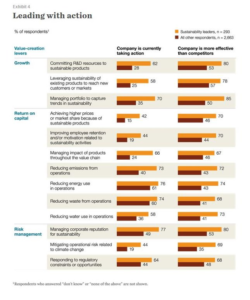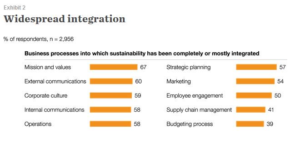
CCN Blogs | 23 October 2018

If you don’t frame it in terms of business longevity, sustainability becomes an altruistic activity which is ‘good to have’. It then gets relegated to periods of time when someone is in a good mood.
Anirban Ghosh, Chief Sustainability Officer, Mahindra Group
Sustainable goals can seem a bit daunting to implement. Why fix something that is working fine? One part of sustainability is long-term thinking and accountability. Any business knows that building trust takes time and planning. Therefore sustainability is a long-term investment in an organisation’s longevity.
Public sector investment with sett standards for the private sector. You can read more about that here, but let’s delve into the three reasons why sustainability is worth pursuing:
At this point there is very little public information on how sustainable practices have saved councils money. However there are many council across the UK who are coming up with their own sustainable initiatives, from Nottinghamshire to Milton Keynes. The problem with sustainable practices, is that they are medium to long term investments, not short terms ones, so I’ll refer to the private sector for some numbers.
The value of sustainable investments for corporations has already been proved. In the case of Dow Chemical, a $2 billion investment in resource efficiency resulted in a $9.8 billion saving from reduced energy consumption. In 1995, through a separate initiative, Dow also created a set of goals for environmental, health, and safety issues, and it has ensured their integration into the company’s processes by tracking progress with clear metrics. As a result Dow, with a 20 percent reduction in absolute greenhouse gas emissions, went well beyond Kyoto Protocol targets by 2005.
Companies seen as sustainable leaders in their industries can also reach new markets and customer easily, achieving higher market shares all while reducing waste. As you can see in the chart below, even those companies who had started taking action to reduce waste and energy use from operations were already creating value and a positive ROI. And the gap widens between competitors when the initiative takes effect.

Mission-led financing is a new idea in public sector financing. This new approach is not about fixing, but about co-creating and co-shaping markets. This could give power back to local public sector organisations for procurement and policy changes.
To quote directly:
“A much more dynamic approach is needed and it has to be outside of silos – green shouldn’t only be key to the department of energy but across the board in all government departments And the way that finance ministries evaluate public investments needs to go outside of the box of simply looking at cost benefits and net present value calculations–which frankly would stop any mission from day one.” –Mariana Mazzucato , Professor in the Economics of Innovation and Public Value at UCL
This means that fiancing will not only look at one part, but at the picture as a whole and how that effects of sustainablily resonate across the public sector.
Technology can help with reporting and the implementation of sustainable practices. Companies such as Patagonia have mapped out their supply chain and from that were able to piece together a ‘big picture’ view of their environmental and social impact. Buckinghamshire County Council saved money by implementing a paperless meeting solution and using the computers and tablets already available to them.
In many cases, there is no need to commission a new system or platform from scratch to achieve sustainable goals or understand a company’s weak points.
However McKinsey has already done some research on where many organisations have an opportunity to expand their sustainable integration.

As you can see in the graph above, organisations are not doing as much to integrate sustainability into internal communications, employee engagement and budgeting processes as other parts of the business. An organisation’s sustainable initiatives are becoming increasingly more important when attracting new talent and retaining employees. The McKinsey study found that sustainable leaders in their survey were better at engaging employees on this issue (and at keeping employees at all levels more informed), suggesting that it’s possible to make the most of this opportunity in sustainability.
Find out how our clients have led sustainable practices from the top by starting with sustainable board meetings and saved money in the process.
Written by Lavaniya Das
Lavaniya Das is a Senior Content Specialist at Azeus Convene UK.
© 2024 County Councils Network | Credits | Site map | Cookies | Privacy Policy.